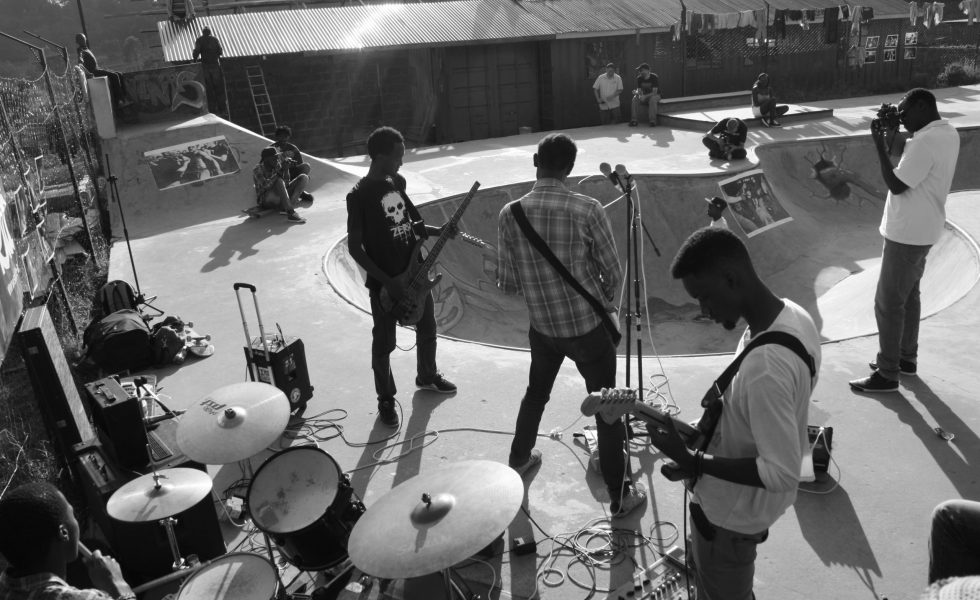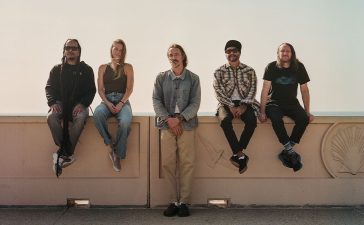There is an undeniable freedom that comes with stepping on a skateboard and feeling the air brush against your skin as you glide gracefully down the street. The simple ‘kick-push’ movement can be likened to letting go of the restraints that weigh you down and hold you back from experiencing the many unexplored facets of life. Punk rock is equally as freeing. The indescribable intensity and vigour of the music is cathartic and offers a liberating safe-haven from the jeers of every day life, Blunt Magazine’s African Correspondent Djae Aroni writes.
Skateboarding and punk have always gone hand-in-hand, although it’s difficult to pin-point when this almost symbiotic relationship began.
During the late 80s and early 90s, VHS skateboarding tapes became an integral part of the scene. These tapes were used to document some of the earliest moments of an ever growing scene and featured numerous skateboarding stalwarts in their early years.
As the scene expanded and progressed, skaters began to create videos that featured music by punk bands and other alternative musicians with genres ranging from hip-hop to jazz. The sheer raw and unfiltered intensity of punk music was the perfect accompaniment to skateboarding videos that often featured riders on the streets or in abandoned pools.
Fast-forward to the late ’90s and early ’00s; as the world began to embrace technology, videogames were established as an integral aspect of pop-culture as we now know it. What immediately comes to mind is Tony Hawk’s Pro Skater series. Apart from allowing you to experience the world of skateboarding, albeit as a gamer, the inclusion of punk music in its soundtrack enhanced the gamer’s experience.
The skateboarding community has had a large influence on the punk community, and vice versa. Over the years, not only have the two communities found a way to co-exist but more often than not, punk music and skateboarding are mutually sustaining. Skate and punk legend Steve Caballero succinctly points out that what links punk and skating is the “Do-it-yourself attitude. The rawness of music and the aggression.”
As the skateboarding world becomes increasingly globalised, skating and punk rock have both found a unique home in Africa as the continent continues to produce a variety of bands and crews. Unsurprisingly, in some instances it just so happens that the members of punk bands stirring mosh pits are the same folks doing kickflips in skate crews.
East Africa’s cultural hub Nairobi’s punk scene has garnered a reputation of being a hotspot for all things punk and the close knit scene has been described as “one of the most vital in the world”. Despite being a niche genre of music, even by global standards, the city has played host to various international punk bands like Stick To Your Guns, Stray From the Path, Ferocious Dog and others. The burgeoning punk scene has been turning heads for all the right reasons and Blunt Mag’s A Punk Guide To: Nairobi offers some insight into the space.
Nairobi is the only capital city in the world that hosts a national park. It is also home to Powerslide, one of the only African punks bands in existence. Oftentimes referred to as “the Keedz”, skateboarding is what initially brought the band together as the members all met through their love and passion for shredding. It’s only after skating together for several years that they formed the band and quickly became one of the most exciting and promising skate-punk bands in the Kenyan rock scene.
Willy Ojiro, guitarist and vocalist of Powerslide, was introduced to punk rock and skateboarding when he just joined the 5th grade. As a youth he contemplates the organic relationship between both disciplines. In his words, “they just stuck with me better than anything else has.”
“Apart from offering a creative outlet, these activities have led to meaningful initiatives being put in place in a bid to help improve the lives of impoverished skaters and rockers.”
When asked about how a bunch of Kenyan kids gravitated towards punk rock and skateboarding, largely Western subcultures, he says: “That’s kinda ineffable. Like when you eat a food for the first time and you love it; you don’t necessarily love it because of how this seasoning brings out this flavour and matches with that seasoning, you love it because you love it.”
In South Africa, Soweto based punk rockers TCIYF, elongated to The Cum In Your Face, also share a similar story as the band members met through skating via the Soweto Skate Society. They then went on to form one of the most exciting punk bands to come from Africa. The Soweto based thrash punk rockers have been compared to the mighty Sex Pistols as their music is “fuelled by frustration of the status quo”, a similar theme to much of the Sex Pistols’ music.
Although thousands of miles apart from each other, both bands share numerous similarities in terms of their beliefs, outlooks and attitudes towards punk rock and skating.
Whilst many youth the world over feel disillusioned, and, to an extent, disenfranchised, as a result of the antics of the ruling class and political elite, bands such as TCIYF and Powerslide are making their anger and disdain known by channelling this frustration directly into their music. Powerslide’s ‘Banana Republic’ single points out that we should “Overthrow the government as it was made to fail”, a sentiment echoed by members of youth all over the continent.
Skateboarding and punk rock have provided a haven for many youths across the continent of Africa and given them a platform to explore other avenues of life outside of the ordinary. TCIYF regularly organise and host shows with alternative bands being invited to play in their hood. This is important as it gives new acts a platform to showcase their abilities as well as highlighting to the younger and more impressionable members of society that there are many options to be explored in life, including punk rock and skateboarding.
Apart from offering a creative outlet, these activities have led to meaningful initiatives being put in place in a bid to help improve the lives of impoverished skaters and rockers. In Kenya, members of the Skateboarding Society of Kenya (SSK) have taken in vulnerable street kids in an effort to help better their lives, a change that would not have been possible had they not met these kids through skateboarding on the streets of Nairobi.
Between the years of 2010-2015, Nairobi played host to the annual Battle of the Bands: Ramps and Amps, an event specifically organised for skaters and rockers alike. Although rock is far from being mainstream in Kenya, the organisers sought to create a platform to allow Kenyan youths to express themselves and explore their interests within a safe and nurturing environment. The battle of the bands competition was geared towards high school bands with the aim being fostering new talent.
For bands like Powerslide and TCIYF, skateboarding and punk are an integral part of their personal identities largely due to “ideologies such as non-conformity, DIY ethics and consciousness about our environment and our fellow man. Many of those ideologies are instilled in us by skateboarding and punk rock”, Willy expresses.
For African youth, trying to find one’s own identity in an ever-changing global landscape has been challenging, especially in this age of digitalisation and technology. With mobile phones and internet access, our hyper exposure to cyberspaces contrasts the experiences of older generations that came before us. As a result, millennials and Gen-Z youth find themselves drawn to art forms and subcultures like punk and skateboarding as they struggle to make sense of the various complexities of life and one’s own personal identity.
In June 2017, Shangilia Skate Park in Nairobi played host to a skate contest as well as a live show – the Santa Cruz Bowl & Moshpit Art Festival. Progressive post-metal band The Seeds of Datur played an incredible set and summoned a moshpit in the skate bowl, but Powerslide stole the show as they provided the soundtrack to the skate contest. It looked exactly like the old skateboarding VHS tapes from the late ’80s and early ’90s.










